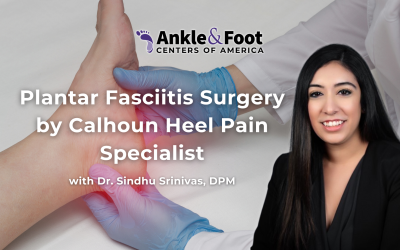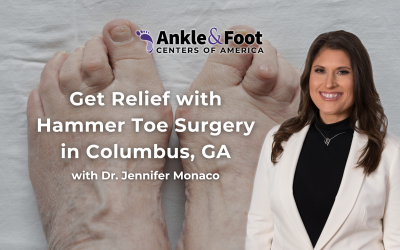Table of Contents
Introduction to Dr. Peter Smith, Foot Specialist in Stockbridge
Dr. Peter Smith is a distinguished foot specialist based in Stockbridge, renowned for his deep expertise and extensive background in podiatric medicine. He completed his undergraduate studies at Penn State University before earning a doctorate in podiatric medicine from Temple University School of Podiatric Medicine in Philadelphia, Pennsylvania. His advanced training includes a rigorous three-year Podiatric Surgical Residency focused on Rearfoot and Ankle surgery at Reading Hospital, a Level 1 Trauma Center.
Dr. Smith holds board certification as a Fellow in Foot and Reconstructive/Rearfoot and Ankle Surgery from the American Board of Podiatric Surgery. He is also certified in Wound Care by the Council for Medical Education and Testing. Currently, Dr. Smith is affiliated with several esteemed medical centers, including Henry Medical Center in Stockbridge, Rockdale Medical Center in Conyers, Piedmont Newnan Hospital, Piedmont Atlanta, and the International Center for Foot and Ankle Surgery in Jonesboro, GA.
An active member of the American College of Foot and Ankle Surgery and the American Podiatric Medical Association, Dr. Smith is committed to staying current with the latest advancements in his field. Operating offices in Conyers and Stockbridge, he offers exceptional foot and ankle care, utilizing his extensive training and broad experience to treat a wide range of podiatric conditions.
How can I schedule an appointment with Dr. Peter Smith?
To schedule an appointment with Dr. Peter Smith at Ankle & Foot Centers, please visit this link. Take the first step towards expert care and recovery from Achilles tendonitis.
Overview of Achilles Tendonitis: Understanding Its Impact
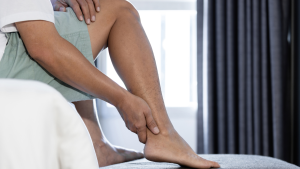 Achilles tendonitis is a widespread and painful ailment affecting the Achilles tendon—the body’s largest tendon, which attaches the calf muscles to the heel bone. This tendon plays a crucial role in essential activities like walking, running, and jumping, essential for both athletic performance and daily functions. It predominantly affects athletes or those who suddenly intensify their physical activities. However, it can also afflict less active individuals who occasionally engage in exercises without proper conditioning.
Achilles tendonitis is a widespread and painful ailment affecting the Achilles tendon—the body’s largest tendon, which attaches the calf muscles to the heel bone. This tendon plays a crucial role in essential activities like walking, running, and jumping, essential for both athletic performance and daily functions. It predominantly affects athletes or those who suddenly intensify their physical activities. However, it can also afflict less active individuals who occasionally engage in exercises without proper conditioning.
The impact of Achilles tendonitis goes beyond physical pain. Chronic discomfort from the condition can hinder a person’s ability to carry out daily tasks, lead to missed work days, and decrease overall physical fitness due to restricted activity. For athletes, the condition presents a significant challenge; it may necessitate prolonged breaks from training and competition, potentially affecting their careers.
Causes of Achilles Tendonitis
The primary cause of Achilles tendinitis is repetitive or intense strain on the Achilles tendon. Factors contributing to this strain include:
- Overuse: Repeatedly engaging the tendon in strenuous activity without adequate rest.
- Improper Footwear: Shoes that do not provide sufficient support or cushioning can increase the risk.
- Tight Calf Muscles: Inflexibility in the calf muscles can put extra stress on the Achilles tendon.
- Abnormal Foot Mechanics: Issues such as flat feet can lead to excessive pronation, which puts additional stress on the tendon.
- Sudden Increases in Physical Activity: Rapidly increasing exercise intensity or duration without proper conditioning.
What are the symptoms of Achilles tendonitis?
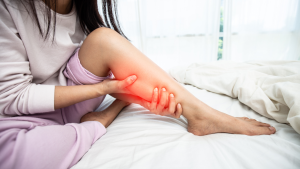 Symptoms typically develop gradually and include:
Symptoms typically develop gradually and include:
- Pain and Stiffness: These are most noticeable in the morning or after periods of rest, improving with mild activity.
- Swelling: The tendon may become swollen and tender to the touch.
- Thickening of the Tendon: Chronic inflammation can lead to a thickening of the tendon, making it feel stiff and sore even during rest.
- Limited Range of Motion: Experiencing difficulty in fully flexing the foot or pointing the toes downward.
How is Achilles tendonitis diagnosed?
Diagnosis of Achilles tendonitis involves a physical examination where the doctor assesses pain, swelling, flexibility, and reflexes of the foot and ankle. Imaging tests like MRI or ultrasound may be employed to determine the severity of the condition and to rule out other possible issues such as tendon tears.
Why It’s Important to Understand Achilles Tendonitis
Understanding Achilles tendonitis is crucial for preventing potential complications, such as the rupture of the Achilles tendon, which requires more intensive treatment and longer recovery. Awareness of the risk factors and early signs of this condition enables individuals to take preventive measures, such as adjusting their exercise routines, choosing the right footwear, and incorporating appropriate stretches and strengthening exercises into their daily regimen. Early intervention and appropriate management can help maintain tendon health, reduce the risk of further injury, and ensure ongoing physical activity without debilitating pain or discomfort.
Conventional Treatments for Achilles Tendonitis
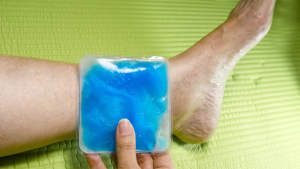 Achilles tendonitis treatment focuses on alleviating pain, reducing inflammation, and encouraging tendon healing. Here’s a streamlined overview of effective conventional treatments:
Achilles tendonitis treatment focuses on alleviating pain, reducing inflammation, and encouraging tendon healing. Here’s a streamlined overview of effective conventional treatments:
Rest and Activity Modification
Limiting stress on the Achilles tendon by avoiding high-impact activities is crucial. Low-impact exercises like swimming or cycling are recommended to maintain fitness without worsening the condition.
Ice Therapy
Applying ice to the affected area for 15-20 minutes every four to six hours, especially post-activity, helps reduce pain and swelling.
Compression and Elevation
Using an elastic bandage for compression and elevating the leg above heart level can help minimize swelling.
Pain Relief Medications
Short-term use of NSAIDs like ibuprofen can alleviate pain and inflammation but should be used with caution due to potential side effects.
Physical Therapy
A physical therapist can develop a program of stretches and strengthening exercises to improve flexibility and reduce tension in the tendon.
Orthotic Devices
Custom orthotics or shoe inserts may be used to correct biomechanical issues like overpronation that stress the Achilles tendon.
Importance of Treatment Adherence
Following these treatment strategies diligently is essential for healing Achilles tendonitis. Rushing back to full activity can lead to re-injury, while proper management typically leads to recovery and a return to regular activities.
Are there advanced treatments available for severe Achilles Tendonitis cases?
While conventional treatments are effective for many cases of Achilles tendonitis, advanced therapies and innovative techniques are increasingly being used to accelerate healing and address more severe or persistent cases. Here’s an overview of the cutting-edge options available:
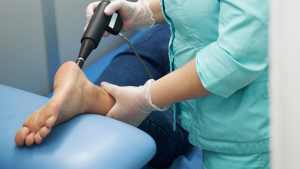 Shockwave Therapy
Shockwave Therapy
Extracorporeal shockwave therapy (ESWT) is a non-invasive treatment that uses sound waves to stimulate healing in injured tissues. Shockwave therapy is particularly beneficial for chronic Achilles tendonitis, as it can promote collagen production and reduce inflammation, often resulting in decreased pain and improved mobility.
Surgical Advances
In cases where conservative treatments have failed, surgical intervention may be necessary. Modern surgical techniques for Achilles tendonitis focus on minimally invasive procedures that remove damaged tissue and stimulate the production of healthy tissue. Recovery times vary, but these methods generally aim to get patients back to their normal activities as quickly as possible.
Embracing Innovation in Treatment
These advanced therapies offer new hope for patients with persistent Achilles tendonitis, providing options beyond traditional approaches. They are typically considered when conventional methods have not led to satisfactory improvement. As with any medical treatment, it’s important for patients to discuss these options thoroughly with their healthcare providers to understand the potential risks and benefits. Advances in medical technology continue to improve the outcomes and recovery times for Achilles tendonitis, ensuring that patients can return to their active lifestyles with minimal disruption.

Dr. Peter Smith’s Approach to Treating Achilles Tendonitis
Dr. Peter Smith, a well-known foot specialist in Stockbridge, GA, uses a detailed and personalized approach to treat Achilles tendonitis. He starts by thoroughly assessing each patient’s unique symptoms, activity level, and medical history to create a customized treatment plan. Dr. Smith combines traditional and modern therapies to provide the best results. He also educates his patients on proper foot care, choosing the right footwear, and how to increase physical activity safely to prevent future problems. For severe cases, Dr. Smith may recommend surgery using the latest minimally invasive techniques, which allow for faster and less painful recovery. He continues to monitor his patients’ recovery through regular check-ups and adjusts treatments as necessary to ensure complete healing. At the core of Dr. Smith’s practice is his commitment to patient-centered care, focusing on giving each patient the attention and tailored treatment they need to get back to their everyday activities. activities pain-free. His use of evidence-based treatments combined with the latest advances in podiatric medicine allows him to offer superior care with the goal of long-term recovery and mobility for his patients.
Choosing the Best Podiatrist for Achilles Tendonitis in Stockbridge
In conclusion, Dr. Peter Smith’s approach to treating Achilles tendonitis in Stockbridge exemplifies his expertise and dedication to delivering high-quality care. His method combines thorough diagnostics, personalized treatment plans, and an integration of both traditional and advanced therapies. This ensures that each patient not only achieves relief from pain but also attains a lasting recovery.
Patients under Dr. Smith’s care are equipped with the knowledge and support needed to understand their condition and manage their recovery effectively. From initial consultation through to follow-up care, Dr. Smith prioritizes communication and education, helping patients avoid future issues and maintain optimal foot health.
For those struggling with Achilles tendonitis, Dr. Peter Smith offers more than just medical treatment; he provides a partnership in health that empowers patients to lead active, fulfilling lives. If you’re experiencing symptoms of Achilles tendonitis, or if you have any other foot-related concerns, consider scheduling a consultation with Dr. Smith in Stockbridge. His comprehensive approach and commitment to patient care make him a trusted choice for those seeking relief and long-term wellness for their feet and ankles. Whether you need routine foot care or specialized treatment, Dr. Smith is ready to assist you with your healthcare needs.
Schedule Your Appointment with Dr. Peter Smith
If you’re ready to take the first step towards resolving your Achilles tendonitis and improving your foot health, schedule an appointment with Dr. Peter Smith today. Dr. Smith is committed to providing personalized care tailored to your specific needs. Visit him at Ankle & Foot Centers and begin your journey to pain-free living.
Book your consultation now to take advantage of Dr. Smith’s expert care and innovative treatment options. Don’t let Achilles tendonitis hold you back—start your path to recovery and enhanced mobility with a specialist you can trust.
Frequently Asked Questions (FAQs) About Achilles Tendonitis Treatment
What is Achilles tendonitis? Achilles tendonitis is an inflammation of the Achilles tendon, the large tendon that connects the calf muscles to the heel bone.
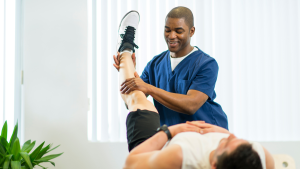 What are the conventional treatments for Achilles tendonitis? Conventional treatments may include rest, ice therapy, compression, elevation of the affected foot, NSAIDs for pain relief, physical therapy, and orthotic devices. These treatments aim to reduce pain and inflammation and promote healing.
What are the conventional treatments for Achilles tendonitis? Conventional treatments may include rest, ice therapy, compression, elevation of the affected foot, NSAIDs for pain relief, physical therapy, and orthotic devices. These treatments aim to reduce pain and inflammation and promote healing.
How long does it take to recover from Achilles tendonitis? The recovery time can vary widely depending on the severity of the condition and the treatment approach. Mild cases may resolve within a few weeks, while more severe or chronic conditions might take several months to heal completely.
Can Achilles tendonitis recur? Yes, Achilles tendonitis can recur, especially if the initial causes such as overuse, improper footwear, or biomechanical issues are not adequately addressed. Ongoing preventive measures, including proper stretching, strengthening exercises, and wearing appropriate footwear, are important.
Why does the back of my heel and calf hurt? Pain in the back of the heel and calf can often be attributed to conditions affecting the Achilles tendon, such as Achilles tendonitis or Achilles tendinosis. This discomfort arises from inflammation or degeneration of the tendon, typically caused by overuse, excessive strain, or inadequate stretching before exercise. Additional contributing factors might include wearing unsupportive footwear, sudden increases in physical activity, or having a naturally tight calf muscle. It’s important to consult a healthcare professional for an accurate diagnosis and appropriate treatment plan to prevent further injury and alleviate the pain.




